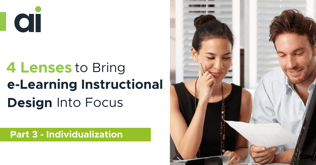Blog
[Michael Allen Webinar] e-Learning: Are You Serious?
by Ethan Edwards, chief instructional strategist | @ethanaedwards


Making e-Learning Success Through Failure
By Ethan Edwards | May 27, 2014 | Custom Learning | 0 Comments
by Ethan Edwards, chief instructional strategist | @ethanaedwards

We’re in the middle of commencement season, so this week I’m drawing inspiration from one of the most well-known (perhaps notorious) commencement speakers of recent memory: David McCullough, Jr. Two years ago he became an international sensation when his commencement address to the graduating class of Wellesley, MA High School went viral. That speech was titled “You’re Not Special.” But I’m not writing about that speech. However, he went on, as all celebrities of the moment, to write a book entitled You’re Not Special and Other Encouragements in which he develops his theme more fully. But this blog isn’t strictly about that either. It’s about the content of an interview between Mr. McCullough and NPR host Diane Rehm.
 Mr. McCullough is an English teacher and has strong opinions about learning and instruction, and even though he was speaking of classroom instruction (and probably is not a huge fan of online learning), a statement of his rather captured what I think needs to be essential in any good e-learning. His statement (somewhat paraphrased as I was driving when I heard this) is:
Mr. McCullough is an English teacher and has strong opinions about learning and instruction, and even though he was speaking of classroom instruction (and probably is not a huge fan of online learning), a statement of his rather captured what I think needs to be essential in any good e-learning. His statement (somewhat paraphrased as I was driving when I heard this) is:
“A learner needs to experience failure without feeling like a failure.”
I wish that could become the credo for e-learning designers. The tools and the models used too frequently in creating e-learning are all about JUDGMENT: declaring a learner’s effort to be a success or a failure. “No,” “Incorrect,” “Try Again,” “Wrong,” and *buzz*, are too prominent among the vocabulary of e-learning scripts. In fact, if the learner made an effort (as opposed to guessing), that act is specifically NOT a failure, even if the actual response was wrong. The process of thinking, of getting it wrong, of fixing it, and moving forward is when learning will occur.
That’s why our instructional designers at Allen Interactions focus so much on simulations of all sorts as a means to engage the learner as opposed to oppressive content dumps in lieu of instruction. Also, that’s why our CCAF Design Model for interactivity design focuses on corrective feedback rather than judgment as a response to learner actions. The failure is essential for learning; the feeling of failure is not.
Let that be our commencement message.

About the Author: Ethan Edwards
Ethan Edwards draws from more than 30 years of industry experience as an elearning instructional designer and developer. He is responsible for the delivery of the internal and external training and communications that reflect Allen Interactions’ unique perspective on creating Meaningful, Memorable, and Motivational learning solutions backed by the best instructional design and latest technologies.
Comments
Would you like to leave a comment?
Related Blog Posts

By: Ethan Edwards | Jul, 2014
Category: Custom Learning, Strategic Consulting, Dr. Michael Allen

Blog
4 Lenses To Bring E-Learning Instructional Design Into Focus: Part 3 - ...
by Ethan Edwards, chief instructional strategist | @ethanaedwards
By: Ethan Edwards | Jun, 2022
Category: Custom Learning

Blog
E-Learning Measurement: Creating an eCycle of Continuous Improvement
by Ethan Edwards, chief instructional strategist | @ethanaedwards
By: Ethan Edwards | Mar, 2016
Category: Custom Learning, Strategic Consulting


